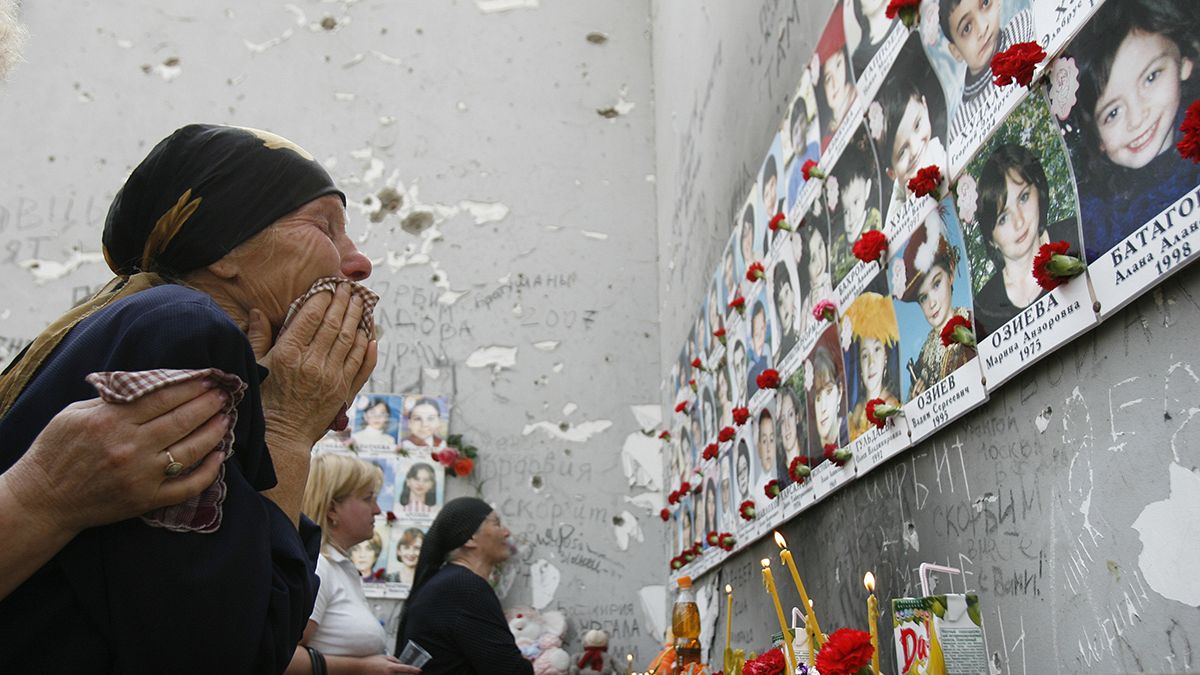On September 1, 2004, hundreds of children returned to school in Beslan like thousands of others across Russia. Traditionally, the start of the new term is a cause of celebration, a family day out. But this year’s event quickly turned into a bloody nightmare.
At 930am, around 30 heavily armed, mostly Ingush and Chechen separatists invaded the school. 1300 people found themselves taken hostage. Mothers, teachers and pupils aged from 7 to 18.
Only around 50 people managed to escape.
For the others, it was the start of three day of hell. They were bundled together in the school gym, and surrounded with explosives. It was suffocatingly hot and no-one was allowed water. It later emerged that the children were forced to drink their own urine.
The terrorists refused them any food or water.
They also had to share the space with the bodies of some 20 people killed at the start of the siege. A visual reminder, if anyone needed it, that the armed group meant business and would deal ruthlessly with any attempted rebellion.
When negotiation efforts failed, the order to retake the building was given on September 3rd.
It was then, on live television, the wider world discovered some of the horror of what went on.
Children dressed simply in their underwear, some hurt, others clearly thirsty and lost. They’re images the world will probably never forget.
At 3pm, after two hours of fierce fighting and almost total confusion, the gym where the hostages were held was destroyed.
When the dust settled, 334 people had been killed, including 186 civilians. Most had been shot or burnt alive.
The ordeal ended after 52 hours. But it changed everything for the survivors and their loved ones.
They were too young or too traumatised to recount their experiences at the time, but now some survivors of the terrorist attack on School Number One have begun to speak about what happened during the three days that shocked the world.
On September 1 2004, Soslan Kokaev, who was then 14-years old, went to school just like all the other children of Beslan. Nowadays he lives in Moscow and has decided to share his memories of that life-changing hostage crisis with euronews.
Soslan Kokaev, Beslan survivor:
“As you know everything began on September 1. The morning didn’t start too badly. I met my friends for what was the start of the school term. But all of a sudden we heard shots – boom! People didn’t pay attention at first, we thought it was just fireworks or balls bursting. But then, the two groups began to surround the school. They were armed, wore camouflage clothing and the majority were bearded. It became clear that this was not a day of celebrations. In the middle of the day they forced us all into the gym. You’ve probably seen the images on television of what happened. They smashed the windows, placed bombs around the perimeter and, in order to deter us from doing anything, killed two men in the middle of the room.”
Alexei Doval, euronews:
“What did the terrorists say to you and how did they behave?”
Soslan Kokaev:
“They were rude and didn’t hesitate to shout at us, swear, shoot into the air or attack us. They did everything to humiliate us and make sure we didn’t interfere with their plans.”
Alexei Doval, euronews:
“When and how did you manage to escape?”
Soslan Kokaev:
“By the morning of September 3, I was already used to the situation I was experiencing but at the same time I wasn’t prepared for another surprise. Suddenly, there was an explosion and almost everybody around me was stunned. There was dust and debris around me. Instinctively I ran towards the windows, which had shattered because of the explosion. I climbed up on to the window sill. The force of the second explosion threw me off it and I fell five metres. Then I just ran.”
Alexei Doval, euronews:
“Then what happened after you ran away?”
Soslan Kokaev:
“It was terrifying and I couldn’t shake off a feeling of anxiety for a while. But perhaps because of my age, just two weeks later I thought of it as something unremarkable. I just saw it as a very intense and dark moment in my life.”
Alexei Doval, euronews:
“Did these tragic events change your life?”
Soslan Kokaev:
“After what happened, I grew up quickly. My perception of what was happening around me and what I saw on television completely changed. But because of what happened to me in Beslan I was invited to study at a high school that is funded by the Mikhail Khodorkovski foundation.”
Alexei Doval, euronews:
“Do you often go to Beslan?”
Soslan Kokaev:
“Yes, I go home around twice a year. At the moment I’m doing a Masters in Management at the State University in Moscow and I alos work for North Ossetia’s autonomous delegation, which has close ties with the Russian government. Over the past decade I have made regular trips to my home.”
Alexei Doval, euronews:
“Have you been back to your school in Beslan?”
Soslan Kokaev:
“Yes, I do visit it but I try to go alone. If by chance I’m in Ossetia between September 1 and 3 I don’t go. I like to be there alone.”
Alexei Doval, euronews:
“Thank you for joining us from Moscow, Soslan Kokaev a student from “School number one” in Beslan, which ten years ago was the scene of a terrorist attack.”
Soslan Kokaev:
Thank you.
